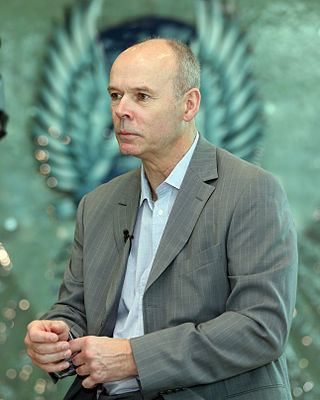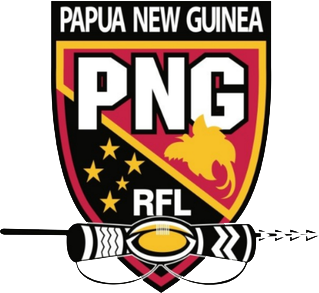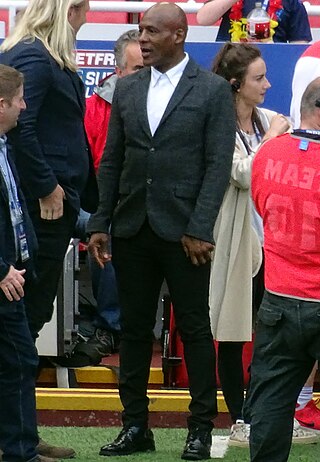Related Research Articles
David Watkins was a Welsh dual-code rugby international, having played both rugby union and rugby league football for both codes' national teams between 1963 and 1979. He captained the British and Irish Lions rugby union side, and made six appearances for the Great Britain rugby league team. With the Wales national rugby league team he played in every match of the 1975 World Cup, and with English club Salford he played more than 400 games over 12 seasons.

Sir Clive Ronald Woodward is an English former rugby union player and coach. He was coach of the England team from 1997 to 2004, managing them to victory in the 2003 Rugby World Cup. He also coached the 2005 British & Irish Lions tour to New Zealand, losing the test series 3–0. He is currently a pundit for ITV Sport, working on their coverage of the Six Nations and Rugby World Cup.

The Great Britain national rugby league team represents Great Britain in rugby league. Administered by the Rugby Football League (RFL), the team is nicknamed The Lions.
The Australian national rugby league team, the Kangaroos, have represented Australia in senior men's rugby league football competitions since the establishment of the game in Australia in 1908. Administered by the Australian Rugby League Commission, the Kangaroos are ranked first in the IRL Men's World Rankings. The team is the most successful in Rugby League World Cup history, having won the competition 12 times, and contested 15 of the 16 finals, only failing to reach the final in the 1954 inaugural tournament. Only five nations have beaten Australia in test matches, and Australia has an overall win percentage of 69%.

Malcolm Norman Meninga is an Australian professional rugby league coach and a former professional rugby league footballer. Meninga is widely regarded as one of the finest players in the game's history. He enjoyed a long career in both Australia and England, playing mainly as a goal-kicking centre. After retiring, Meninga has enjoyed success as a coach, and is currently the head coach of Australian national team.

The Wales national rugby league team represents Wales in representative rugby league football matches. Currently the team is ranked 17th in the IRL World Rankings. The team was run under the auspices of the Rugby Football League, but an independent body, Wales Rugby League, now runs the team from Cardiff. Six Welsh players have been entered into the Rugby Football League Hall of Fame.

The Papua New Guinea national rugby league team represents Papua New Guinea in the sport of rugby league football.

Cuthwyn Ellery Hanley is an English former rugby league player and coach. Over a nineteen-year professional career (1978–1997), he played for Bradford Northern, Wigan, Balmain, Western Suburbs and Leeds. He won 36 caps for Great Britain, captaining the team from 1988 to 1992, and 2 for England. Nicknamed 'Mr Magic' and 'The Black Pearl', he played most often as a stand-off or loose forward after starting out as a centre or wing.
Kenneth Howard "Killer" Kearney was an Australian rugby footballer – a dual-code international player – and a rugby league coach. He represented the Wallabies in seven Tests, and the Kangaroos in thirty-one Test matches and World Cup games. He captained Australia in nine rugby league Test matches in 1956 and 1957. He was a hooker and captain-coach with the St. George Dragons in the first half of their eleven-year consecutive premiership winning run from 1956 to 1966. He is considered one of Australia's finest footballers of the 20th century.

Ernest Arthur "George" Anlezark, also known as Alec, was an Australian rugby league and rugby union player – a dual-code rugby international.He was a pioneer Australian representative footballer selected in the first Australia national rugby union team overseas touring side to New Zealand in 1905 and representing the Kangaroos in the first Kangaroo tour of Great Britain in 1908.

Mike A. Ford is an English rugby union coach, and former professional rugby league footballer. He is currently the Head coach of the Belgian national rugby union team.
Bob Lindner is an Australian former professional rugby league footballer who played in the 1980s and 1990s, and coached in the 1990s. An Australia national and Queensland State of Origin representative forward, he is one of a handful of players to be named man-of-the-match in State of Origin football more than once. Fifteen years after his retirement from football in Australia, he had made the most appearances and scored the most tries of any forward in State of Origin history.
Roger Millward was an English rugby league footballer who played in the 1960s and 1970s, and coached in the 1980s and 1990s. A goal-kicking stand-off, he gained a high level of prominence in the sport in England by playing for Hull Kingston Rovers (captain) and Castleford, as well as representing Great Britain. Millward was awarded the Order of the British Empire (MBE) in 1983. Nicknamed “Roger the Dodger” for his elusive running, he was inducted into the Rugby League Hall of Fame in 2000. Millward’s ability placed him in the top bracket of rugby league halves to have ever played the game.
George Fairbairn is a Scottish former rugby union and professional rugby league footballer who played in the 1970s and 1980s, and coached rugby league in the 1980s and 1990s. He played representative level rugby union (RU) for Borders, and at club level for Kelso RFC, and representative level rugby league (RL) for Great Britain and England, and at club level for Wigan, winning the Man of Steel Award in 1980, and Hull Kingston Rovers, as a goal-kicking fullback, and coached at representative level rugby league for Scotland, and at club level Wigan, Hull Kingston Rovers, and Huddersfield.
The 1986 Kangaroo tour of Great Britain and France was the sixteenth Kangaroo tour in which the Australian national rugby league team plays a number of tour matches against British and French teams, in addition to the Test matches. The next Kangaroo tour was staged in 1990.

Derek Turner, also known by the nickname of "Rocky", was an English World Cup winning professional rugby league footballer who played in the 1940s, 1950s and 1960s, and coached in the 1960s, 1970s and 1980s. He played at representative level for Great Britain, England, Yorkshire and Great Britain & France, and at club level for Hull Kingston Rovers, Oldham and Wakefield Trinity (captain), with whom he won three Challenge Cup Finals, as a second-row, or more usually loose forward, and coached at club level for Castleford, Leeds and Wakefield Trinity.
The 1982 Kangaroo tour was the fifteenth Kangaroo tour where the Australian national rugby league team played a number of matches against British and French rugby league teams, in addition to the Test matches. The Australia national rugby league team have generally since 1908 barring wartime, toured Great Britain every four years often capping the tour with matches and Tests in France. This regular touring side are known as the Kangaroos.
Terrence Flanagan MBE is an English former professional rugby league footballer who played in the 1970s and 1980s, usually as a loose forward. He played at representative level for Great Britain and Lancashire, and at club level for Oldham.
The 1992 Great Britain Lions tour was a tour by the Great Britain national rugby league team, nicknamed the 'Lions', of Papua New Guinea, Australia and New Zealand which took place between May and July 1992. The tour was the last of such length undertaken by the Great Britain team, and included a test match against Papua New Guinea, a three-test series against Australia for The Ashes, and a two-test series against New Zealand for the Baskerville Shield, all interspersed with matches against local club and representative teams.
The 1967–68 Kangaroo tour of Great Britain and France was the twelfth Kangaroo Tour, and saw the Australian national rugby league team travel to Europe and play twenty-one matches against British and French club and representative rugby league teams, in addition to three Test matches against Great Britain and three Tests against the French. It followed the tour of 1963-64 and the next was staged in 1973.
References
- ↑ Rugby League Project
- ↑ Coach statistics at rugbyleagueproject.org
- ↑ Loughborough University – SSES – About Us Archived 26 October 2007 at the Wayback Machine
- ↑ Official Website of the British & Irish Lions Rugby Tour - management Archived 27 September 2007 at the Wayback Machine
- ↑ BBC SPORT| Rugby Union| Welsh
- ↑ Sport news and updates – Telegraph Archived 24 December 2005 at the Wayback Machine
- ↑ BBC SPORT| Rugby Union| English| Robinson 'chose wrong approach'
- ↑ "Planet Rugby | Rugby Union Tournaments | Aviva Premiership". Archived from the original on 7 September 2012.
- ↑ Larder returns to Worcester